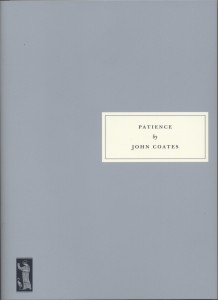272pp, paperback, £12.00
Reviewed by Shirley Whiteside
Inside its modest grey cover the end papers of this handsome book are a riot of bright colours. This seems particularly apt as the content of John Coates’s 1953 comic novel is far more vibrant than its unassuming title would suggest.
Patience Gathorne-Galley is the 27-year-old wife of Edward and mother of their three little daughters. She is independently wealthy, lives in a charming house and has a nanny and a cook to help her run her home efficiently. She often entertains her husband’s business colleagues and never utters a word of complaint. In short, excepting her failure to give her husband a son, she is the perfect wife. What gives Patience most pleasure in life is her children, Helen, her younger sister, and her devotion to her Catholic faith. She is her name personified.
Lionel, Patience’s austere older brother, arrives one day with news that Edward is having an affair. Patience is intrigued rather than upset, wondering why anyone would choose to have sex when not absolutely necessary. She is secretly relieved that another woman has taken on that duty of marriage for her. When she meets Philip, a friend of Helen’s husband, she suddenly discovers a world of love and passion that she never suspected existed. In spite of the teachings of her faith, she cannot believe that the happiness and fulfilment she feels with Philip can be wrong. And so Patience must find a way to leave her husband and marry Philip, without going against her church or giving up custody of her children to Edward.
Patience is portrayed as an innocent and naive character, a kind of Pollyana, who doesn’t expect any more from life than she already has. By modern standards she seems middle-aged but by the mores of the 1950s she would no doubt seem a model young wife. As she is awakened from her extended childhood she starts to see how selfish Edward has been and how inconsiderate he has been sexually. It is surprising to have a male writer of this period making a plea for women to have the same sexual satisfaction as men – and no doubt why the book was banned inIreland. Interestingly, the more liberated Patience becomes the less likeable she is as a character as a rather self-centred, selfish streak emerges. Lionel is fascinating in his constant search for Sin, very definitely with a capital S. He believes Helen is living in Sin as she divorced and remarried outside the church but it is to worldly-wise Helen that Patience turns when her life is turned upside down by love.
In terms of language and tone, there are echoes of Noel Coward in the book’s utter Englishness, combined with the light-hearted humour ofHollywoodsex comedies of the era. The dialogue is arch and achingly polite and Coates has a fine instinct for unusual metaphors. As Patience discovers her hidden bitch she likens it to having ‘a gloriously soft, silken, Persian cat purring in the middle of her stomach’. Reading the novel, the pages slip by with consummate ease, the sign of a writer in complete control of his material. This edition has an introduction by Maureen Lipman who writes that the novel reads like a film script in waiting (it was adapted for the stage in 1955, and starred Geraldine McEwan in her first leading role).
Coates’s comedy is feather light and frothy but there is a darker underbelly looking at how the Catholic Church and 1950s society viewed and valued women, their role in the home and the wider world, which will certainly resonate with many women today.

